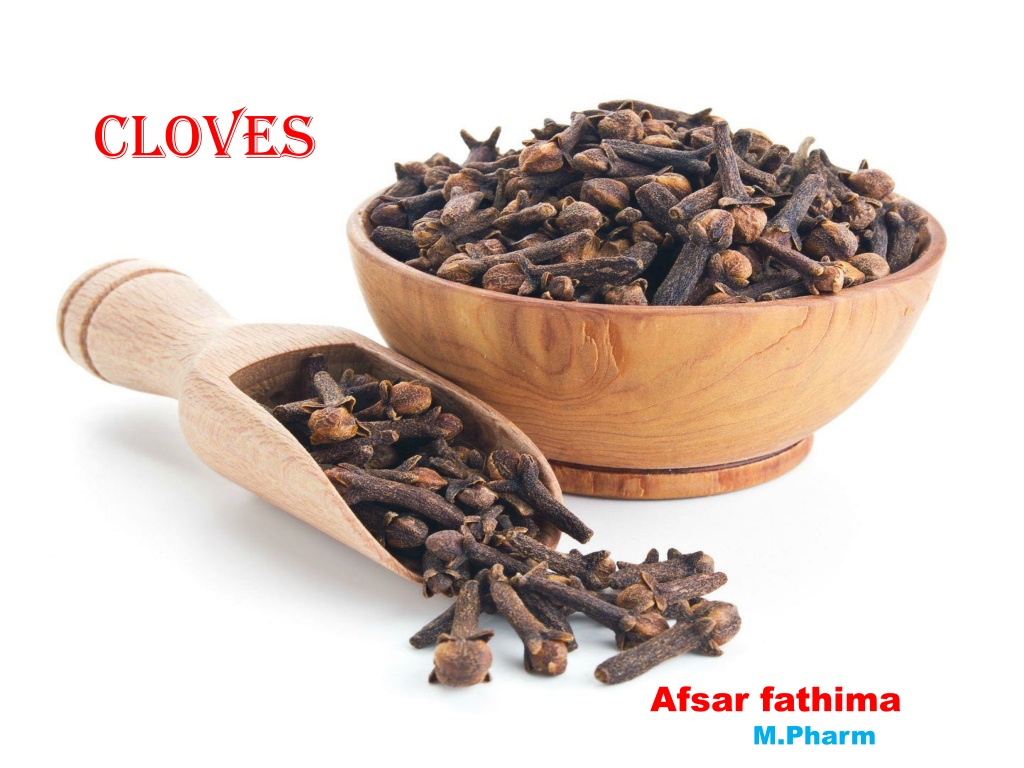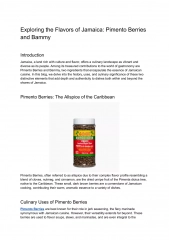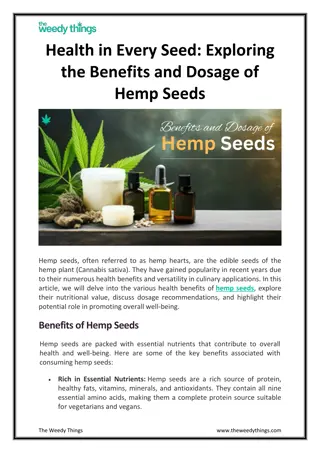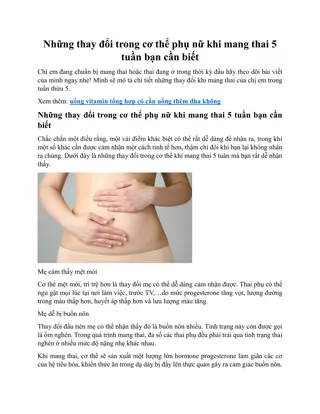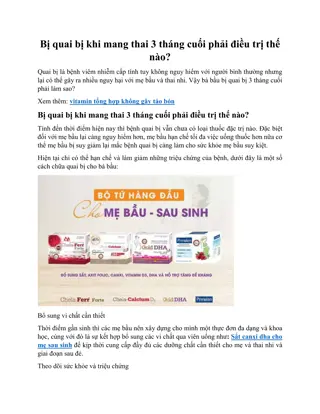Exploring the Health Benefits of Cloves: A Comprehensive Guide
Cloves, known as 'laung' in Hindi, are a versatile spice with medicinal properties. Originating from Asian countries, they are rich in nutrients like carbohydrates, proteins, and minerals. Cloves have been used in Ayurvedic and Chinese medicine for centuries due to their various health benefits. The bioactive compounds in cloves offer antioxidant, anti-inflammatory, and other therapeutic properties. Discover the diverse uses and nutritional value of cloves in this informative overview.
Download Presentation

Please find below an Image/Link to download the presentation.
The content on the website is provided AS IS for your information and personal use only. It may not be sold, licensed, or shared on other websites without obtaining consent from the author. Download presentation by click this link. If you encounter any issues during the download, it is possible that the publisher has removed the file from their server.
E N D
Presentation Transcript
Cloves Afsar fathima M.Pharm
Cloves or laung in Hindi, Lavangam in Telugu, Kirambu in Tamil, Grambu in Malayalam, Lavangapattai in Kannada, Labango in Bengali, Laving in Gujarati, Lavang (Marathi & Punjabi) are a very common type of spices that are extensively used for cooking and other purposes. It is also prominently used in Cigarettes to add flavour.
Cloves are one of the spices indigenous to Asian countries like Indonesia, India, Pakistan, and even areas of East Africa. It is native to the Maluku islands in Indonesia. Cloves are a popular flavouring agents used in a variety of ways across the world, particularly in Asia. Cloves form the culinary base in a number of different Asian cuisines.
It is the dried bud of the flower from the tree Syzygium aromaticum. It belongs to the plant family named Myrtaceae. The plant is an evergreen plant growing in tropical and subtropical conditions. Clove is a herb and people use various parts of the plant, including the dried bud, stems, and leaves to make medicine. Clove oil is also famous for its medicinal properties.
Clove has been used for thousands of years in India and China, not only as a spice and condiment, but also as a medicine for many ailments. Ayurvedic medicine used cloves for tooth decay, halitosis, and bad breath. In Chinese medicine, clove was considered to possess aphrodisiac properties.
According to the National Nutrient Database for Standard Reference, the nutrients found in 100 grams of cloves include 65g of carbohydrate, 6g of protein, 13g of total lipids, 2g of sugars, 274 kcal of energy and 33g of dietary fiber. Minerals in cloves include calcium, iron, magnesium, phosphorous, potassium, sodium, and zinc. The vitamins found in cloves include vitamin C, thiamin, riboflavin, niacin, folate, vitamin B6, vitamin B12, vitamin A, vitamin E, vitamin D, and vitamin K.
Certain bioactive compounds have been isolated from clove extracts. Some of them include: flavonoids, hexane, methylene chloride, ethanol, thymol, eugenol, and benzene. These biochemicals have been reported to possess various properties, including antioxidant, hepato- protective, anti-microbia, and anti-inflammatory properties.
Health Benefits Of Cloves Cure for Headaches: Headaches can be reduced by using cloves. Make a paste of a few cloves and mix it with a dash of rock salt. Add this to a glass of milk. This mixture reduces headaches quickly and effectively. Aphrodisiac Properties: Spices such as clove and nutmeg have been said to possess aphrodisiac properties, according to Unani medicine. Experiments on clove and nutmeg extracts were tested against standard drugs administered for that reason and both clove and nutmeg showed positive results.
Cure for Oral Diseases: Cloves can be taken for gum diseases like gingivitis and periodontitis. Clove bud extracts significantly controlled the growth of oral pathogens, which are responsible for various oral diseases. Cloves can also be used for toothaches due to their pain-killing properties.
Anti-Inflammatory Properties: Cloves possess anti-inflammatory and pain-killing properties. Studies on clove extracts being administered in lab rats suggest that the presence of eugenol reduced the inflammation caused by edema. It was also confirmed that eugenol has the ability to reduce pain by stimulating pain receptors.
Anti-Mutagenic Properties: Mutagens are those chemicals that change the genetic makeup of the DNA by causing mutations. Biochemical compounds found in cloves, like phenylpropanoids, possess anti- mutagenic properties. These were administered on cells treated with mutagens and they were able to control the mutagenic effects to a significant rate.
Liver Protection: Cloves contain high amounts of antioxidants, which are ideal for protecting the organs from the effects of free radicals, especially the liver. Metabolism, in the long run, increases free radical production and lipid profile, while decreasing the antioxidants in the liver. Clove extracts are helpful in counteracting those effects with its hepatoprotective properties.
Antibacterial Properties: Cloves have been tested for their antibacterial properties against a number of human pathogens. The extracts of cloves were potent enough to kill those pathogens. Clove extracts are also effective against the specific bacteria that spreads cholera.
Better Digestion: Cloves improve digestion by stimulating the secretion of digestive enzymes. Cloves are also good for reducing flatulence, gastric irritability, dyspepsia and nausea. Cloves can be roasted, powdered, and taken with honey for relief in digestive disorders.
Side effects: Clove oils must not be used directly; instead they must be diluted either in olive oil or in distilled water. Clove extract oil is generally considered to be safe, but certain studies have revealed that they possess cytotoxic properties. There are two major components present in clove extract oil, eugenol and B-caryophyllene. These compounds were particularly effective against fibroblasts and endothelial cells.
